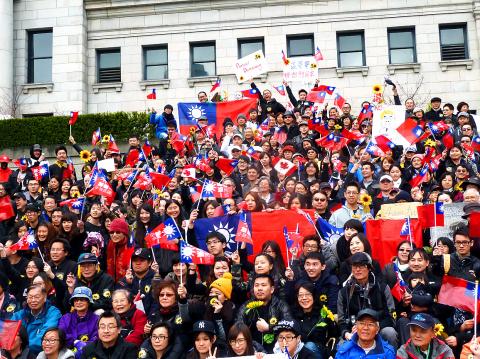Over 200 protesters swarmed the steps of the Vancouver Art Gallery on Saturday in a show of solidarity with Taiwanese students, hours before planned demonstrations in Taiwan that on Sunday attracted hundreds of thousands to Ketagalan Boulevard to protest the controversial trade pact with China.
The group, made up of students, seniors and concerned residents from Vancouver and neighboring municipalities, held signs reading “Taiwan not for sale” and “democracy is not for trade” in the business district of downtown Vancouver. They also carried sunflowers and plastered the symbol on their clothes, which event co-organizer Hans Lin, 28, says represents student protesters as Taiwan’s bright future.
Demonstrater Jeremy Hsieh (謝亞諭), 32, who arrived at the rainy scene with his family, has lived in Vancouver since 1995 but still has family and friends back home, some of whom voted for President Ma Ying-jeou (馬英九).

Photo: Jenny Peng
“It’s very unfair for the government to pass such an important thing without notifying [the public]. Clearly, people are still confused. They don’t really know what’s happening. I think most people are not against signing a treaty with China, but they’re against how they passed it.”
Most of the protesters have been monitoring news about the students’ occupation of the Legislative Yuan since March 18 via the Internet. He and others like Jenna Wang (王仁娜) said they’re “heartbroken” from seeing clashes between the police and students.
“When I left Taiwan, everything was going the right way. [It was] positive and I saw a lot of hope,” Wang said.
Hsieh added that he sympathizes with police officers and the difficult position they’re in.
“[The police are] just doing their job. They don’t really want to [go] against the students. They’re just standing there to protect the students, protect the government and enforce the law,” he said.
The biggest fear of the trade deal for Carol Pan (張理瑲), 67, is the livelihood of small businesses in Taiwan. “Chinese companies — they’re powerful, they’re rich, they’re big,” she said.
The serious mood of the event was lightened by a sing-along between organizers and the crowd of Good Night, Taiwan (晚安台灣) and a photo shoot with protesters in the sign of 318 to commemorate the day students stormed legislative chambers.
Event co-organizer Gilbert Lin, 23, said they’ll be sending photos and video footage to student leaders in Taiwan to keep the “momentum” going.
“This [singing] is what Taiwanese students are doing as well during their sit-ins, during their peaceful protest. They sing songs that represent their love of Taiwan,” Lin said.
Aside from overseas Taiwanese citizens, roughly 20 protesters from Hong Kong came to show their support.
“We don’t want Taiwan to be the next Hong Kong. We don’t want Taiwanese to lose their freedom [and] their rights,” said Alex Cheung as he waved a large British Hong Kong flag.
The event was organized by roughly 10 organizers and 15 volunteers, most of whom have never met until their first rally on March 21. Vancouver is one of four Canadian cities including Calgary, Montreal and Toronto to hold protests this weekend.

June 9 to June 15 A photo of two men riding trendy high-wheel Penny-Farthing bicycles past a Qing Dynasty gate aptly captures the essence of Taipei in 1897 — a newly colonized city on the cusp of great change. The Japanese began making significant modifications to the cityscape in 1899, tearing down Qing-era structures, widening boulevards and installing Western-style infrastructure and buildings. The photographer, Minosuke Imamura, only spent a year in Taiwan as a cartographer for the governor-general’s office, but he left behind a treasure trove of 130 images showing life at the onset of Japanese rule, spanning July 1897 to

One of the most important gripes that Taiwanese have about the Democratic Progressive Party (DPP) is that it has failed to deliver concretely on higher wages, housing prices and other bread-and-butter issues. The parallel complaint is that the DPP cares only about glamor issues, such as removing markers of Chinese Nationalist Party (KMT) colonialism by renaming them, or what the KMT codes as “de-Sinification.” Once again, as a critical election looms, the DPP is presenting evidence for that charge. The KMT was quick to jump on the recent proposal of the Ministry of the Interior (MOI) to rename roads that symbolize

On the evening of June 1, Control Yuan Secretary-General Lee Chun-yi (李俊俋) apologized and resigned in disgrace. His crime was instructing his driver to use a Control Yuan vehicle to transport his dog to a pet grooming salon. The Control Yuan is the government branch that investigates, audits and impeaches government officials for, among other things, misuse of government funds, so his misuse of a government vehicle was highly inappropriate. If this story were told to anyone living in the golden era of swaggering gangsters, flashy nouveau riche businessmen, and corrupt “black gold” politics of the 1980s and 1990s, they would have laughed.

It was just before 6am on a sunny November morning and I could hardly contain my excitement as I arrived at the wharf where I would catch the boat to one of Penghu’s most difficult-to-access islands, a trip that had been on my list for nearly a decade. Little did I know, my dream would soon be crushed. Unsure about which boat was heading to Huayu (花嶼), I found someone who appeared to be a local and asked if this was the right place to wait. “Oh, the boat to Huayu’s been canceled today,” she told me. I couldn’t believe my ears. Surely,